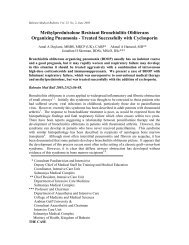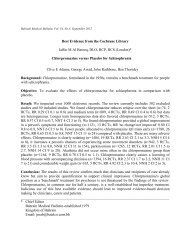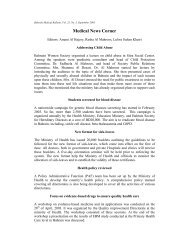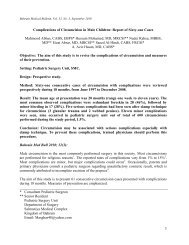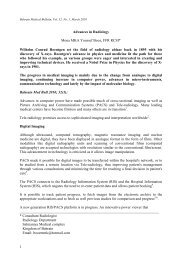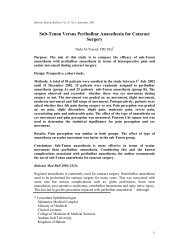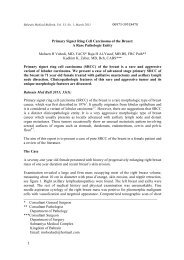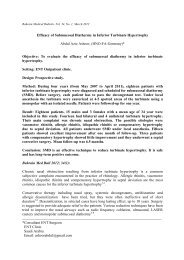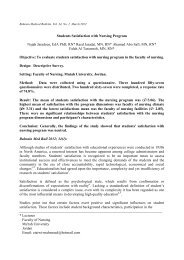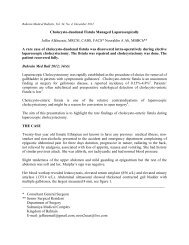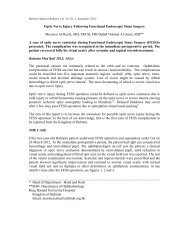Risk factors of Breast Cancer in Bahrain - Bahrain Medical Bulletin
Risk factors of Breast Cancer in Bahrain - Bahrain Medical Bulletin
Risk factors of Breast Cancer in Bahrain - Bahrain Medical Bulletin
You also want an ePaper? Increase the reach of your titles
YUMPU automatically turns print PDFs into web optimized ePapers that Google loves.
an age <strong>of</strong> more than 55 years, <strong>in</strong> US patients, it was 65.1% while <strong>in</strong> the same age group <strong>in</strong><br />
this study it was 30.5% (N=32) 11 .<br />
These significant differences support our previous study and show that younger age<br />
group (less than 55 years) were more at risk <strong>of</strong> develop<strong>in</strong>g breast cancer <strong>in</strong> Bahra<strong>in</strong><br />
(69.5%), while <strong>in</strong> the United States (65%) were above 55 years.<br />
The second most important risk factor is family history. Women with a family history <strong>of</strong><br />
breast cancer, especially a first-degree relative (mother, sister or daughter), have an<br />
<strong>in</strong>creased risk <strong>of</strong> develop<strong>in</strong>g breast cancer. The risk is higher if more than one firstdegree<br />
relative developed breast cancer and it <strong>in</strong>creases the younger the relative at the<br />
time <strong>of</strong> diagnosis 5 .<br />
The understand<strong>in</strong>g <strong>of</strong> familial breast cancer has improved by the study <strong>of</strong> BRCA1 and<br />
BRCA2 genes and other genetic mutations. Women born with a BRCA1 or BRCA2<br />
mutation are more likely to develop breast cancer, with a lifetime risk <strong>of</strong> about 80% by<br />
the age <strong>of</strong> 70 years 10 . It is thought that environmental <strong>factors</strong> <strong>in</strong>teract with genetic <strong>factors</strong><br />
<strong>in</strong> br<strong>in</strong>g<strong>in</strong>g about these breast cancers, but little is known about these <strong>in</strong>teractions.<br />
Approximately 5% to 10% <strong>of</strong> breast cancer cases are thought to be caused by genetic<br />
mutations 10 . On the other hand, women with a significant family history <strong>of</strong> breast cancer<br />
rema<strong>in</strong> at <strong>in</strong>creased risk for develop<strong>in</strong>g the disease, despite hav<strong>in</strong>g negative BRCA1 and<br />
BRCA2 gene mutations, the risk is about 30-40% 12 . However, genetic test<strong>in</strong>g is required<br />
to identify the patients with genetic mutations.<br />
The family history <strong>of</strong> malignancy <strong>in</strong> our previous study was (35%); family history <strong>of</strong><br />
breast cancer <strong>in</strong> this study was (20.9%). Both studies support the f<strong>in</strong>d<strong>in</strong>gs <strong>in</strong> the<br />
<strong>in</strong>ternational literature. Therefore, family history <strong>of</strong> breast cancer is considered<br />
significant risk factor for develop<strong>in</strong>g breast cancer. However, genetic test<strong>in</strong>g is required<br />
to identify the patients with genetic mutations.<br />
BRCA1, BRCA2 and TP53 are associated with an <strong>in</strong>creased risk <strong>of</strong> breast cancer. These<br />
mutations are associated with early-onset breast cancer <strong>in</strong> patients with positive family<br />
history <strong>of</strong> malignancy 13-15 . This study revealed that 30% <strong>of</strong> patients who are younger than<br />
35 years old have positive family history <strong>of</strong> malignancy regardless <strong>of</strong> the degree <strong>of</strong><br />
relationship and the type <strong>of</strong> malignancy. We need more studies to <strong>in</strong>itiate a better<br />
protocol regard<strong>in</strong>g such patients.<br />
Although previous history <strong>of</strong> breast cancer is one <strong>of</strong> the major risk <strong>factors</strong>, we found it<br />
positive <strong>in</strong> only two patients (1.9%); therefore, no conclusion can be arrived at.<br />
In a study, it was shown that a woman who has had breast cancer, her risk <strong>of</strong> develop<strong>in</strong>g<br />
a second primary breast cancer is 2-6 times the risk seen <strong>in</strong> the general population.<br />
Therefore, the past personal history <strong>of</strong> malignancy is considered a risk factor for<br />
develop<strong>in</strong>g breast cancer 16 .<br />
Estrogens are thought to be associated with the risk <strong>of</strong> breast cancer through their<br />
<strong>in</strong>fluence on cell proliferation and DNA damage, as well as promotion <strong>of</strong> cancer growth.<br />
Early menarche results <strong>in</strong> prolonged exposure to endogenous estrogens and progesterone;<br />
7





